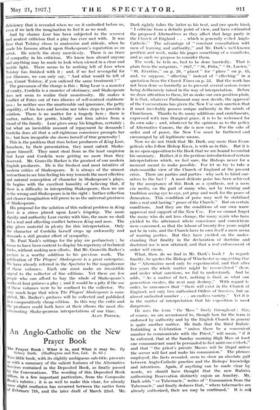The Tragedy of Kingship
The Tragedie of King Lear. Introduction by H. Granville
. Barker. (Been, -The Players' Shakespeare. £4 4s. net.)
CIIARLES LAMB considered that Lear could never be acted, and lIazlitt agreed with him. In the main they were criti- cizing the stage and pointing to its limitations. It is hard to cramp the broad moods of nature into those few square yards. Storms on the stage too often leave the audience uneasy. They feel that the representation is 'unequal to reality ; or else, if much pains have been taken for their benefit, they are distracted by the ingenuity of the mechanism.
But there is more to it than this. A dramatically strong play can overcome any corivention of its production. Lear, in short; should be able to "ride the whirhirind and direct the storm." Lamb stumbles when he tries to express his under- lying criticism. The greatness of Lear is not in corporal dimensions, but in intellectual," he states. "On the stage we see nothing but corporal infirmities and weakness, the impotence of rage ; while-we read -it, we see not Lear but We are Lear:' This is an argument that could be used of anY great play, a mere rationalization of his feelings. The greatness of Prometheus is not in corporal dimensions, but in intellectual." "The greatness of Hamlet is not-in corPmll dimensions, but in intellectual," _-No, there is some defect the play that Lamb is unwilling- to allow ; there is ofis
deficiency that is revealed when we sec it embodied before us, even if we lack the imagination to feel it as we read.
And by chance Lear has been subjected to the severest nod acutest criticism that a play has ever met with. It was Lear that Tolstoy chose to anatomize and ridicule, when he made his famous attack upon Shakespeare's reputation as an artist. He retells the story mercilessly. There is no trace „I sympathy in his criticism. We know how absurd anyone mid anything may be made to look when viewed in a clear and hostile light. There seems to be nothing left of Lear when Tolstoy has finished with it ; and, if we feel revengeful for ]ost illusions, we can only say, "And what would be left of you, Count Tolstoy, if you suffered the same treatment ? "
The gravamen of the charge is this : King Lear is a monsta of vanity, Cordelia is a monster of obstinacy, and Shakespeare does not seem to realize their monstrosity. He makes a Conflict of Fates out of two idiocies of self-centred stubborn- ness; he neither sees the unutterable sad ignorance, the petty stupidity, of his hero and heroine nor takes steps to provide a solution. There is no matter for a tragedy here ; there is matter, rather, for gentle, kindly and firm advice from a friend of the family. Lear gives away his kingdom, certainly ; but what an incredible amount of repayment he demands ! Cordelia does all that a self-righteous conscience prompts her to ; but how incapable she shows herself of true generosity !
This is the problem that rises before producers of King Lear. Somehow, by their presentation, they must outwit Shake- speare himself. They must steal from us the least suspicion that Lear and Cordelia were getting no more than they deserved. Mr. Granville Barker is the greatest of our modern English producers. He is the freshest and most intuitive of modern critics of Shakespeare. It is always of the utmost instruction to see him feeling his way towards the most effective and natural conception of character in Shakespeare's plays. lie begins with the excellent humility of believing that, if there is a difficulty in interpreting Shakespeare, then we are in the wrong and Shakespeare is in the right : further reflection and clearer imagination will prove to us the universal greatness of Shakespeare.
His proposal for the solution of this radical problem in King Lear is a stress placed upon Lear's kingship. The more dignity and authority Lear carries with him, the more we shall feel a real and affecting conflict between King and man. The play gives material in plenty for this interpretation. Only the character of Cordelia herself crops up awkwardly and demands a still greater effort of sympathy.
Mr. Paul Nash's settings for the play are perfunctory ; he seems to have been content to display his repertory of technical tricks, without making new efforts. But Mr. Granville Barker's preface is a worthy addition to his previous work. The Publication of The Players' Shakespeare is a great enterprise. We have already referred in the Spectator to the magnificence of these volumes. Each one must make an irresistible appeal to the collector of fine editions. Yet there are few People who can afford to buy the whole of Shakespeare's Works at four guineas a play ; and it would be a pity if the use of these volumes were to be confined to the collector. We wry much hope that when The Players' Shakespeare is com- pleted, Mr. Barker's prefaces will be collected and published in a comparatively cheap edition. In this way the critic and the producer could both have at their elbows the most dis- criminating Shakespearean interpretations of our time.
ALAN PORTER.











































 Previous page
Previous page